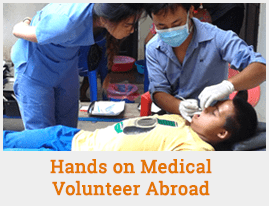VOLUNTEER IN COSTA RICA
' I LOVE this experience in chitwan for though short period! '
Xue Ying Fiona WangVeterinary Internship-Domestic & Agriculture
The Most Affordable
Volunteer fees starting at just
$275
The Most Reputed
Since 1998, over 18,000 Volunteers, hundreds of online reviews
The Most Transparent
No Middlemen. Pay your fees directly to host families and projects.
Project Summary
This project includes veterinary work including animal care, spay/neuter events in the community, vaccination clinics, learning and assisting in veterinary procedures and the office needs, and animal welfare education. Due to the culture in Latin America in general, animals are generally not looked upon as integral members of the family as they are in more developed countries. Unfortunately, this plays a large role in animals being neglected or abandoned in the streets or rural areas.
The chances of injury, abandonment, abuse, or illness are very high therefore. Interns in this program will spend a minimum of four weeks learning and gaining experience under a certified veterinarian. Participate and shadow in some of the procedures, consultations, and emergency response calls for hurt or injured animals. Vet students advanced in their study are also able to put on castration campaigns with our local veterinarians and shelters.
Skills/Qualifications Needed
Beginner to intermediate knowledge of Spanish is preferred (but not mandatory). If a Participants cannot speak Spanish, we suggest that he or she enrolls in our Spanish language program. Intern should have some studies, experience, or interest in the field. There are no specific qualifications needed to join this project in Costa Rica.
Volunteer's Responsibilities
Participants in this project will be expected to be open minded, patient, caring, and self-starters (able to recognize what needs to be done or who needs to be helped). Participants help with the Rescue, rehabilitation, and finding homes for homeless, abandoned, and injured dogs and cats.
Participants will help give general care for the animals in the shelter, help in our efforts of adoption of the animals and foster homes, help host low-cost spay/neuter and vaccination clinics for the pets of low-income families, or educate children and families about animal care and welfare. Participants are expected to maintain a professional attitude and help with whatever task (cleaning, feeding, playing, walking, giving medications, etc..) as needed.
Accommodation/Food/Supervision
Participants have the option to either stay with well-screened host families or at our home base. The accommodations depend predominantly on availability. Both accommodations offer safe living quarters with running water, electricity, and a shared bathroom. Host families do not always have wifi/cable, but do offer running water and electricity which typically is readily available.
Participants staying at the program home bass can expect dorm-style housing with access to a kitchen, shared rooms and bathrooms, Wi-Fi, television/cable, and optional A/C and laundry service. Participants additionally will be living on-site for Spanish classes, weekly meetings, and local community development opportunities. Participants receive three light meals per day at either accommodation.
 1-2543048951
1-2543048951


